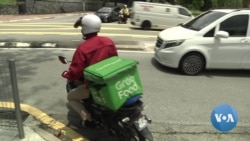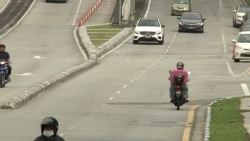Almost every day 26-year-old Amirul Rashid is on his motorbike delivering food. He must deal with traffic, changing weather conditions and sometimes impatient customers who keep sending messages asking when their food will arrive. Rashid says it’s the same situation for most food delivery riders and unfortunately that prompts some of them to disobey traffic rules, whether it’s the speed limit or a stop light.
“Pressure usually comes from the customers because usually the customers want their orders fast,” Rashid says. But he also blames the riders themselves for rushing on the roads so they can make more money. “We often hear about delivery riders getting in accidents,” Amirul added.
Although there is not a specific breakdown for delivery riders, 66% of the people killed in road accidents in Malaysia are motorcyclists according to the Malaysian Institute of Road Safety Research and there are often headlines in the news about accidents involving food delivery riders.
The institute recently conducted a four-day study of 11 intersections. It observed almost 3500 motorbike delivery riders including food and package deliveries. According to the research, about two-thirds of the delivery riders disobeyed traffic rules and about one-third committed a serious safety violation including holding their phones in their hands while riding, running red lights, making illegal U-turns and riding in the wrong direction.
“It is like a norm for food delivery riders in Malaysia to behave this way,” says Khairil Anwar the road safety institute’s director-general.
Most food deliveries in Malaysia are made with motorbikes. The riders are typically freelancers who own their bikes. The more deliveries they make the more money they earn. Khairil says part of the problem is the system gives the riders incentive to break traffic rules in order to complete each delivery faster so they can pick up their next order sooner.
Due to the pandemic, restaurants in Malaysia have had to reduce their seating capacity to maintain social distancing between tables. This contributes to an increasing number of food delivery orders, according to local restaurant managers. Additionally, the economic downturn has led some people who’ve lost their jobs to turn to food delivery as a new way to earn a living.
The two biggest food delivery companies in Malaysia are Grab and Foodpanda. Both companies declined requests for an interview, and neither was willing to give figures on food delivery orders.
But Khairil called their current safety training “inadequate” adding that these companies need to do more to promote a work culture that emphasizes safety.
“We have to imbed these safety things into these motorcyclists' minds.” says Khairil. “It’s not only about deliveries, the products, it must be safe attitude per se, safe behavior.”
The institute says it is developing a road safety training program for delivery riders and talking with Grab and Foodpanda about it. The details are still being worked out, but it could potentially involve both classes and practical road training. Delivery riders VOA spoke with support the plan. “It’s good if it happens, says 20-year-old Mohd Zulfadzli Sham. “We are delivery riders and safety is important for us.”
“I think it’s a good suggestion,” says Amirul Rashid adding that he thinks most delivery riders would also support this training. Several other riders gave similar responses.
Khairil, from the road safety institute, says in addition to better safety education for the riders there needs to be more enforcement of road regulations. This could involve monitoring traffic cameras to catch riders running red lights or making illegal U-turns. “We need to change this thinking they have that maybe they can beat the traffic light or ignore the traffic light,” Khairil says. “If a driver breaks the rules, perhaps they should be required to undergo even more extensive safety training.”







